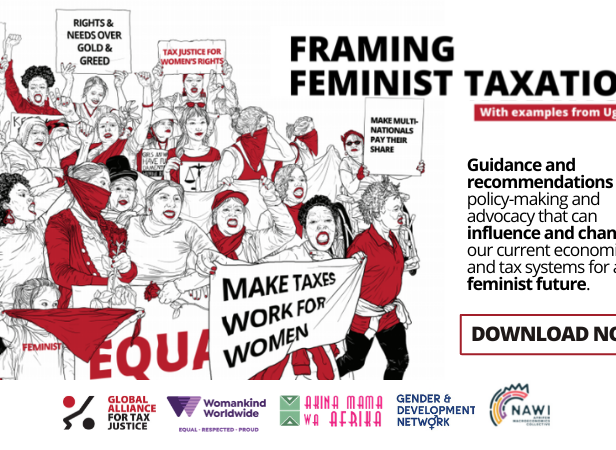
New publication provides guidance and recommendations for policy-making and advocacy that can influence and change our current economic and tax systems for a feminist future.
Women and girls are disproportionately hurt by current global economic and taxation systems. Even though challenges may differ from country to country, everywhere women tend to proportionately pay more taxes and benefit less from them, as gender-biased and regressive tax systems continue to deepen gender inequality. While the socio-economic crisis triggered by the COVID-19 pandemic has worsened this situation, it only highlights the urgency for structural changes to make taxes work for women.
To support tax justice and gender justice advocates to challenge international financial institutions’ role in shaping tax systems, the Global Alliance for Tax Justice’s (GATJ) Tax and Gender Working Group, Womankind Worldwide and Akina Mama wa Afrika developed ‘Framing Feminist Taxation’. Presenting a feminist intersectional and human rights-based approach to fiscal policies, the guide brings together examples from Uganda and demonstrates how to link a global advocacy issue to a national framework in a way that is useful for influencing both in country and international spaces. It provides tools to assess the gender bias in the current tax system and how to advocate towards a feminist tax framework – a tax system that upholds human rights and enables substantive gender equality.
What will you find in ‘Framing Feminist Taxation’?
Chapter 1: Introduction to International Financial and Tax Architecture – introduces the global financial and tax architecture and lists institutions involved in global economic (mis)governance. This allows the reader to understand the global picture of the tax and economic systems as well as possible institutions to target for advocacy to realise a feminist taxation framework.
Chapter 2: Feminist Perspectives and Principles – highlights feminist perspectives and principles that underpin a feminist analysis and help us uncover the power dynamics and structures that influence the distribution of wealth, resources and a host of benefits on current and future outcomes.
Chapter 3: Feminist-Based Economics: Reimagining the Economic and Tax Systems – provides guidance to feminist economics and a human-rights based approach and how we can collectively reimagine the economy using feminist economics. This chapter provides tools that users can use to determine to what extent their tax systems are gender responsive.
Chapter 4: From Plans to Actions: An Advocacy Guide for a Feminist Taxation Framework to Fulfill Women’s Rights – provides guidance and recommendations for policy-making and advocacy that can influence and change our current economic and tax systems for an intersectional feminist future. It provides concrete policy points and actions based on the previous work of those in the economic, tax and gender justice movements with specific examples from Uganda and the GATJ’s campaign on ‘Tax Justice for Women’s Rights’.
**********
About Global Alliance for Tax Justice
The Global Alliance for Tax Justice (GATJ) is a Southern-led global coalition in the tax justice movement, campaigning for progressive and redistributive taxation systems nationally, and for a transparent, inclusive and representative global tax governance internationally.
Created in 2013, GATJ comprises six regional networks in Asia (Tax & Fiscal Justice Asia), Africa (Tax Justice Network Africa), Latin America (Red de Justicia Fiscal de América Latina y el Caribe), Europe (Tax Justice-Europe) and North America (Canadians for Tax Fairness & FACT Coalition), collectively representing hundreds of organisations.
About GATJ’s Tax and Gender Working Group
Established in 2016, the Tax and Gender Working Group is a space for the Global Alliance for Tax Justice’s members and committed partners to engage directly in campaigns and policy work on tax and gender. It aims to strengthen the global integration of tax and gender justice movements, and has been broadening participation by working closely with women’s rights organisations, global trade unions, academics, NGOs and CSOs. Currently co-chaired by GATJ and Womankind Worldwide, the Working Group co-organises, together with GATJ’s regional networks, the annual campaign Tax Justice for Women’s Rights.
About Womankind Worldwide
Womankind Worldwide is a global women’s rights organisation working in solidarity and equal partnership with women’s rights organisations and movements to transform the lives of women. Our vision is of a just world where the rights of all women are respected, valued and realised. Womankind supports women’s movements to strengthen and grow by providing a range of tools, including technical support, communications, connectivity and shared learning, joint advocacy and fundraising.
About Akina Mama wa Afrika
Akina Mama wa Afrika (AMwA) is a feminist-Pan-African leadership development organization that was founded in 1985 by a group of visionary African women in the United Kingdom but later relocated to Africa with headquarters in Kampala, Uganda. Our work is rooted in feminist principles and beliefs guided by the Charter of Feminist Principles for African Feminists which define our leadership development programme and movement building activities. AMWA provides strategic direction in key Pan-African networks including NGO CSW Africa, Solidarity for African Women’s Rights and the Gender Is My Agenda Campaign. AMwA also has consultative status with the United Nations Economic and Social Council.
**********
For more information, please contact
Lays Ushirobira
Global Alliance for Tax Justice
[email protected]
Bridie Taylor
Womankind Worldwide
[email protected]
Gomolemo Leseiane
Akina Mama wa Afrika
[email protected] org

